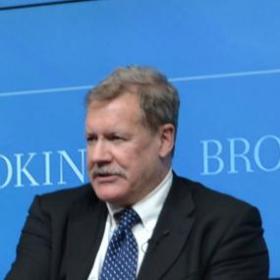
Russia's Cyber Power
In New Europe, EWI Fellow Greg Austin looks at some recent reports that highlight Russia's growing cyber espionage and defense capabilities.
In just two weeks, Russia has returned to the news as a military cyber power in three separate reports: one about its superior stealth, a second about its nuclear missiles, and a third reporting a deeper cyber alliance with China. Meanwhile, as important as these issues are to international and individual security, diplomacy between Russia and the European Union (EU) on the issues is only weakly developed.
On 16 October, in Austin Texas, the Director of National Intelligence in the United States, James Clapper, said “I worry a lot more about the Russians” when it comes to U.S. defences in cyberspace, according to the Wall St Journal. He observed that the Russians are more stealthy in their cyber operations than China, leaving fewer traces of their activity. One presumes he was talking more of cyber espionage, given that Russia has been named in public reports by the U.S. government, along with China (France and Israel) as the main source of cyber espionage threats to the United States.
On the same day, the Russian Ministry of Defence announced that its Strategic Missile Forces would be creating new cyber defence units as part of the transition by the armed forces to automated (computerized) command and control. These units would be assigned both to silo-based and mobile nuclear missiles. Affirming that the forces would be equipped with the most modern equipment, the associated photograph carries the image of a very clunky laptop. This image confirmed pictorially that the announcement by the Russian armed forces puts them a decade (or even decades) behind the United States in developing this particular capability. Such an imbalance in the cyber defence capability of the strategic missile forces of the two sides is highly dangerous. Some analyst believe that it invites the more powerful side (the United States) to consider preemptive use of cyber attacks against the strategic nuclear command control of the weaker side (Russia), thereby undermining strategic stability. On 21 October, the Russian newspaper, Kommersant, reported that President Putin and his Chinese counterpart, Xi Jinping, would sign a bilateral treaty on cyberspace issues during a visit by the Russian to Beijing on 10 November. While the treaty itself may be largely symbolic, it will over time provide framework for the two countries to build a degree of interdependence between the IT sectors of the two countries. At the moment, such technology transfer is quite weak since China prefers, and has rather easy access to Western IT products. If anything, it will be Russia who may gain most in information technology transfer from China in the long run. Russia has niche capabilities in cyber military and surveillance technologies, but China is advancing on a broader front.
The treaty will likely focus most on the shared commitment of Russia and China to create international norms that privilege the state over the private citizen in control of the internet and constrain internet-based interventions in domestic politics by foreign activists or other states.
This is an important area of policy to monitor. Russia is, as James Clapper indicated, for now more powerful than China in military and surveillance technologies in cyberspace. In the 2014 rankings for the annual network readiness index of the World Economic Forum, Russia stood at 50th, up from 54th, the year before. In contrast, China was ranked in 2014 at 62nd, down from 61st in 2013. In a major report on EU cyber diplomacy by two European think tanks published in June 2014, the lack of effective collaboration between the Union and Russia is a recurrent theme. Russia’s cyber power will only increase. We need to understand it better.

